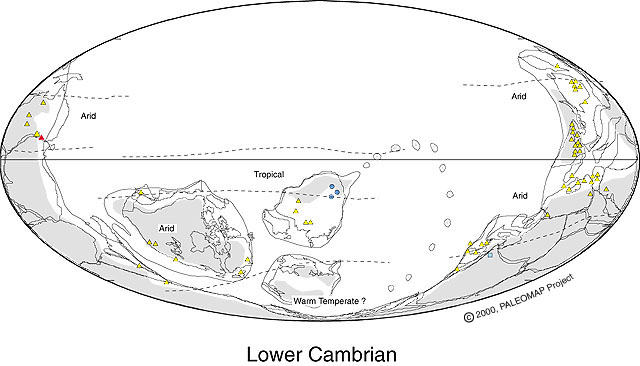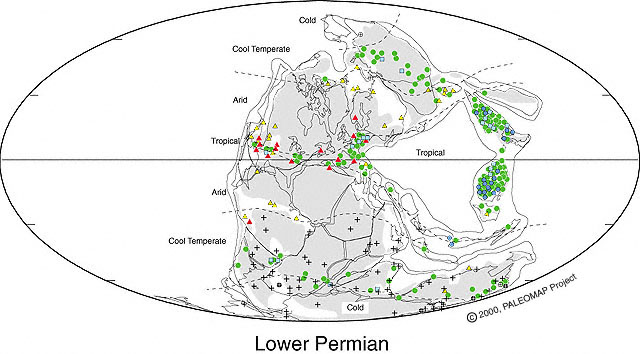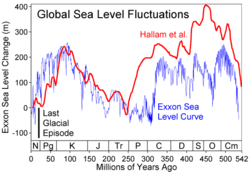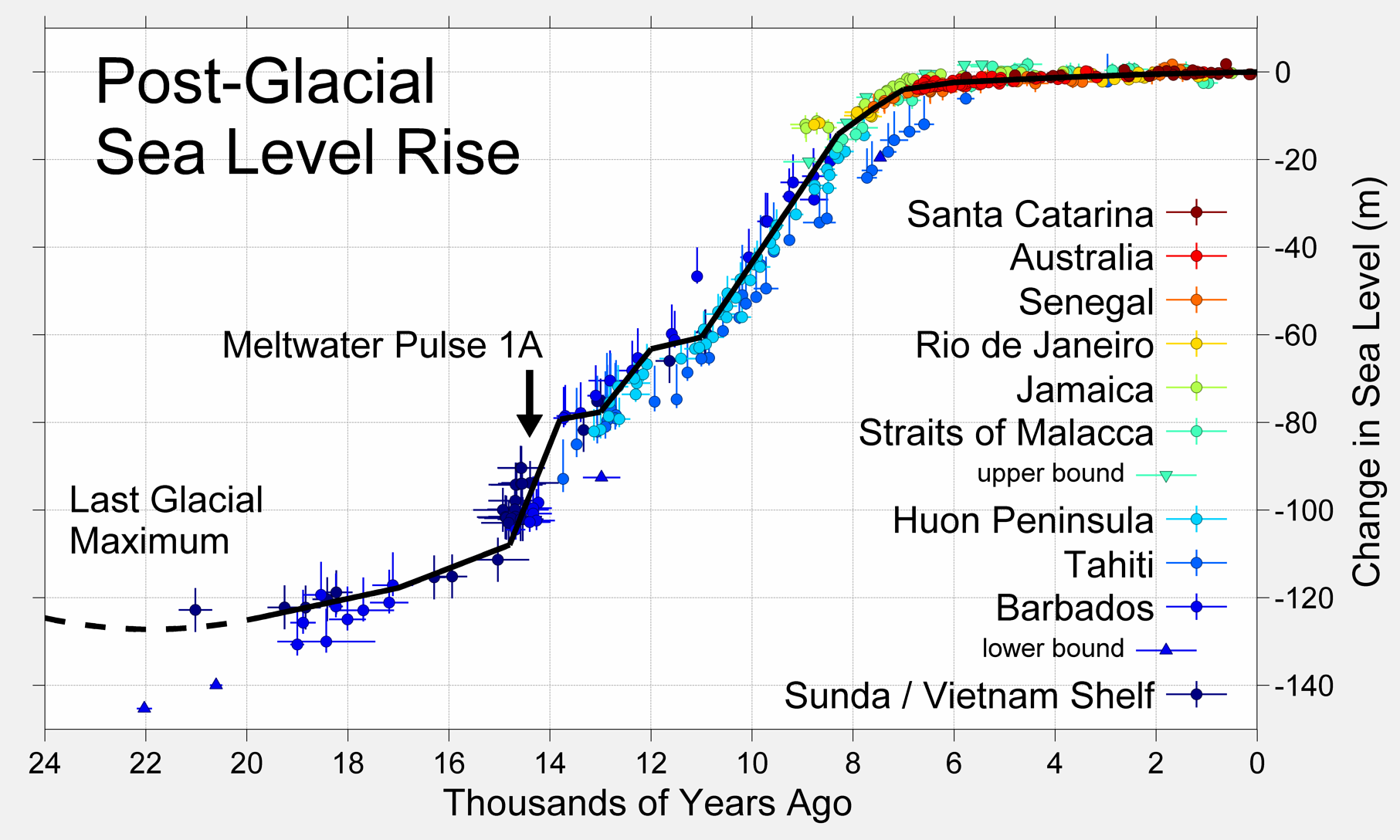Please don’t feed me some line of crap about how all the ice is going to melt. We both know the world has been warmer and the ice caps melted and sometimes they didn’t melt. In fact, the ice caps are actually a rare occurence in earth’s history so we should be surprised that they are even here.
-- Shooshmon, The Blackboard
This is a trope that recurs over and over in "skeptic" arguments: if a state of affairs has ever occurred before (even if we're talking about hundreds of thousands or even hundreds of millions of years ago) then it is not "unprecedented" and hence, no big deal.

I didn't find this myth at Skeptical Science (although #45, "Co2 was higher in the past," could be considered a specific instance) so it is officially in our purview as a minor myth.

Basically, the fallacy here relies on ignorance of just how long the earth has been around and how variable its climate has been over billions of years of geologic time. At times the earth has been covered in ice; at times the ice has melted, and sea levels have been hundreds of feet higher than today. The relevant question, however, is not whether a state of affairs has ever existed before, but what it means for us, people, and our seven (soon nine) billion-strong civilization.
The realistic way to relate these two ideas -- whether a condition has happened before, and what it's likely to be a problem for people -- is obviously not to look at the whole of geological time, but a much briefer span of time, human history, the time in which we have been living in settled communities and growing food to feed ourselves. Those are the conditions in which humans have prospered.
When we look at that period, approximately 13,000 years, we find something surprising. Let's take a look at Shooshmon's example (if that's not too strong a term), the ice caps, as reflected in sea level measurements:

Looks like quite a bit of variation. But look at the x-axis. It's marked in intervals of 50 million years. What does that have to do with anything human? Not much. Next, let's look at the recent past:

Over the last 8,000 years, sea levels have been rock-solid stable. That's the whole of recorded human history; China and Egypt, Judea and Babaylon, the Greeks and the Macedonian and the Roman Empires -- all of it. Prior, sea levels were lower (more ice). They have never been higher in all the time people have been growing their own food. So are higher sea levels safe, because the dinosaurs didn't mind them at all? Of course not. Among other differences, dinosaurs did not live by the hundreds of millions in costal cities and floodplains.
You can identify the same pattern in temperature records:

You can see semi-regular oscillations of several degrees. But always look at your axis. This is five million years of temperature records. The swings that seem to be coming one right after the other are actually occurring at a brisk rate of one every 40,000 to 100,000 years. Now look at it on a human timescale:

All of human civilization has lived in a band of +/- about 0.5C. Until the last decade, in which we've broken through that temperature ceiling headed for parts unknown -- headed, if things keep going on as they are, for conditions not seen on this earth for millions of years, things unknown not just to human civilizations but to the entire history of our species. Unprecedented? Maybe not in the strictest sense. Unsafe? You'd better believe it.
UPDATE: This exchange on The Blackboard captures the above in admirably terse style:
bugs (Comment#52733) September 24th, 2010 at 7:18 am
liza (Comment#52725) September 24th, 2010 at 5:50 am
Bugs, I know what the sea level height was 125,000 years ago because my husband is a geologist and I can google. That graph shows you that “today” isn’t such a big deal.
If you are a rock, or a planet, it’s not big deal.
I've just stumbled upon your website, and I'm already disappointed. After reading this excellent article, I'd thought I'd finally found IT: a palaeoclimatology/GW website to excite my long dormant geology-classroom brain cells.
ReplyDeleteAnd, more importantly, to address CO2's role in geology in a forum for climate-skepticism-prone geologists. Sort of a continuation of Richard Alley's "Biggest Control Knob" video.
http://www.agu.org/meetings/fm09/lectures/lecture_videos/A23A.shtml
But I read on, and find that you also have other interests. Too bad.
Kudos, though, for providing an in-order-of-posting Blog list, like that at More Grumbine Science. They are a real convenience in catching up on what's new in the blogosphere since the last visit. And you even provide the titles.
I've put Idiot Tracker near the top of my supplemental "NON-Grumbine" favorites list.
The Arctic sea ice melt vigil is almost over (despite today's reprieve of a new low). Warm SST and thin ice will continue to wait for a little longer, for compacting winds. But eventually a NSIDC call of 'minimum' will stand.
ReplyDeleteThe obvious next race to follow for compulsives is "Will 2010 be the hottest year?" The results of the first eight hot months are in. The question now is how the remaining cooler months compare to the competitor's (1998?2005?).
But where would this forum be held? It won't require efforts like Neven's, at his Arctic Sea Ice blog. This is a less serious and one-off topic. But I think it could largely carry itself in the thread, between postings, as happens over there. The daily visit to the newest comments is the habit; finding a new article is just gravy.
"But I read on, and find that you also have other interests. Too bad."
ReplyDeleteIt's mostly climate stuff. But I throw in a curve ball now and then. I have a number of things I'm interested in, and they can't all have their own blog.
"The obvious next race to follow for compulsives is "Will 2010 be the hottest year?"
Yes, and Intrade, which was way up, is now way down. I always thought 90+ percent was a little high, given the developimang La Nina. Evidently punters didn't like the August GISS anomaly.
Yet La Nina appears to be stalled for now, with little change in the last two weeks. I like our chance to break a record in at least one of the four major data sets.
Speaking of compulsive behavior, lucia at The Blackboard has turned me on to tracking the 12-month running average vs the multi-model mean (http://rankexploits.com/musings/2010/uah-august-0-511-up-from-july/). That's pretty much the closest thing I've found to a direct apples-to-apples comparison of IPPC projections to reality.
Very useful blog. Thanks for this wonderful post.
ReplyDeleteac duct cleaning Naranja florida